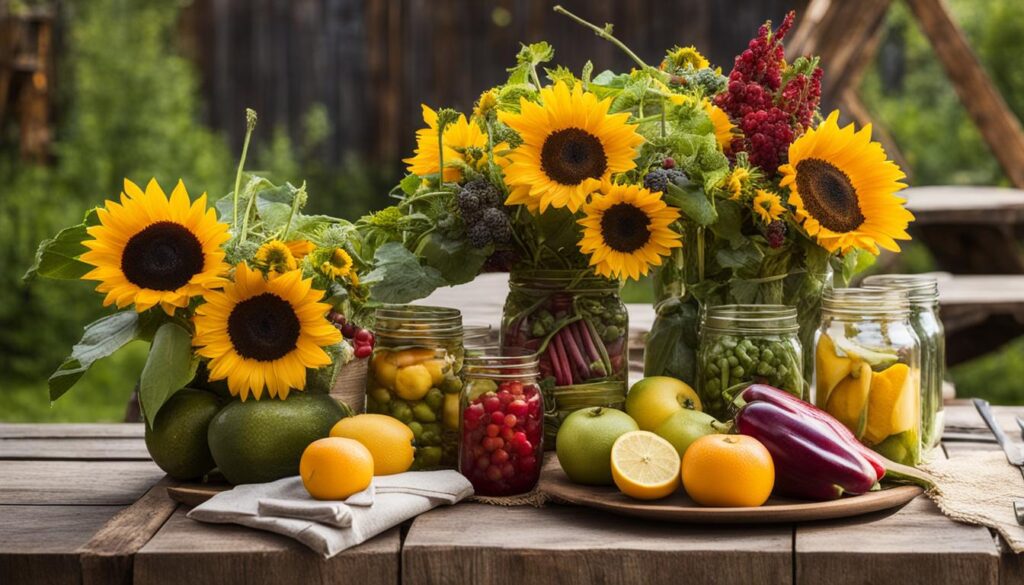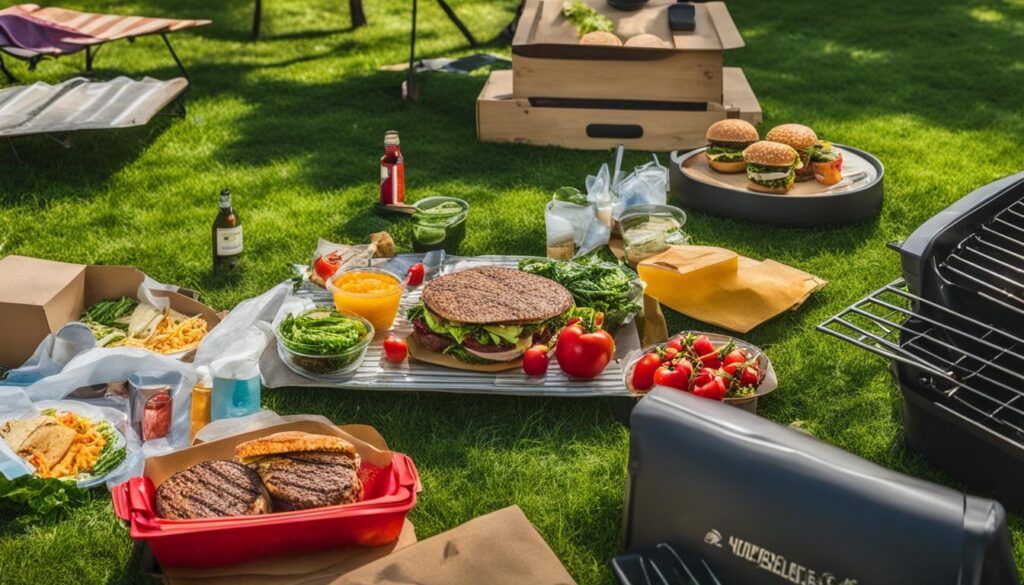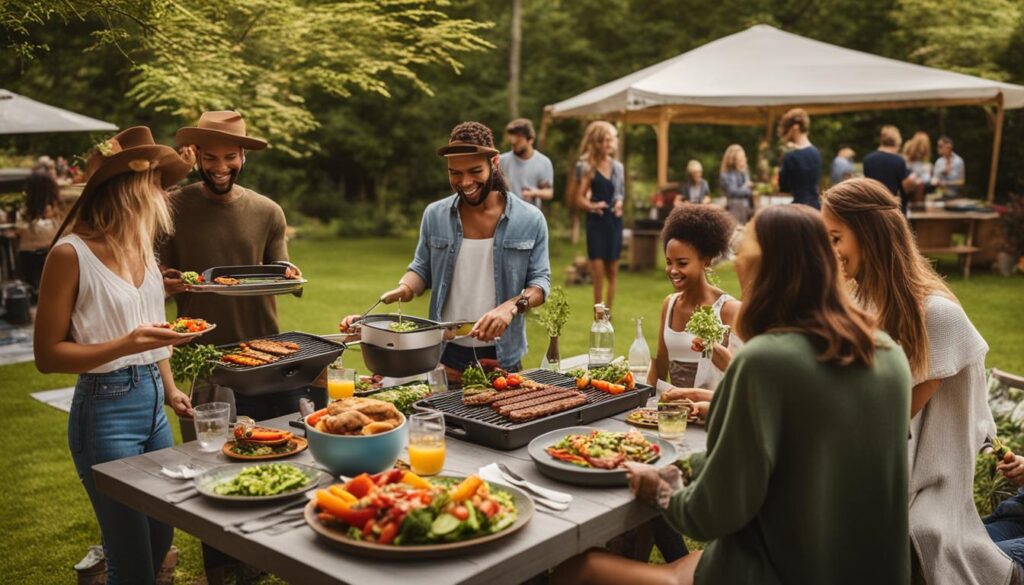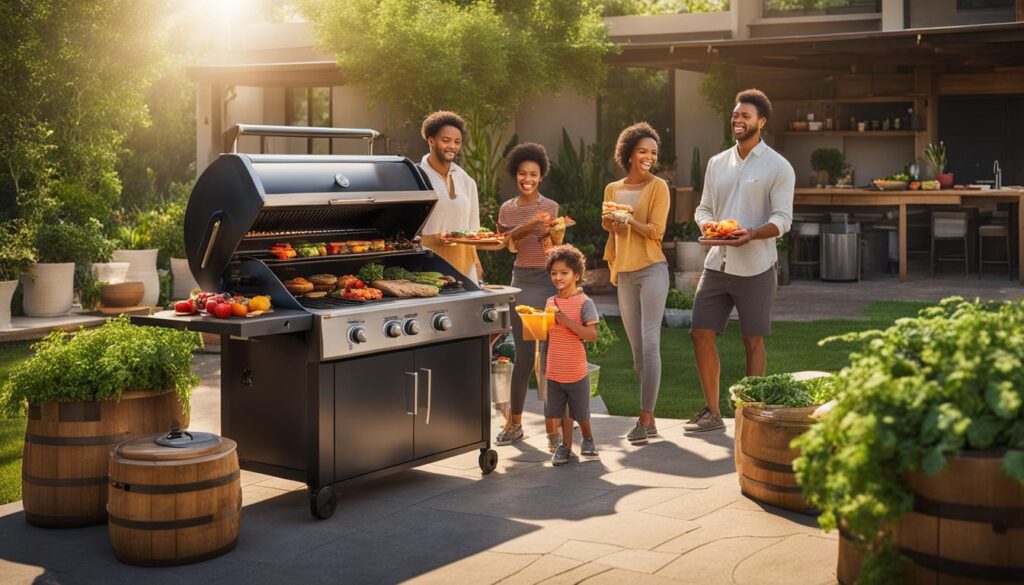Summer is the perfect time to enjoy some outdoor dining with family and friends. However, many of us tend to overlook the environmental impact of our barbecues and picnics. That’s why we are here to help you have a sustainable and eco-friendly dining experience without compromising on the fun. In this article, we will provide you with tips on how to implement eco-friendly BBQ techniques, sustainable food practices, and give green picnic suggestions, helping you make the most of the summer sun while reducing your carbon footprint.
Key Takeaways
- Opt for sustainable BBQ equipment and utensils to minimize waste and the environmental impact.
- Choose local, seasonal, and organic ingredients for your outdoor dining.
- Reduce meat consumption and choose sustainable options for your barbecues and picnics.
- Minimize food waste and use compostable packaging to reduce environmental impact and waste.
- Connect with local sustainable communities for an enriching and eco-friendly outdoor dining experience.
Choose Sustainable BBQ Equipment and Utensils
At any outdoor dining event, selecting sustainable BBQ equipment and utensils can make a considerable difference to the environment. Reusable and compostable products are excellent eco-friendly barbecue and picnic essentials that can reduce the waste generated during outdoor dining experiences.
When choosing equipment, consider investing in a durable grill that will serve you for years to come. A solar-powered grill or an electric grill is a green option to consider as it reduces smoke and pollution. If you prefer to stick to charcoal grills, and you are using natural charcoal and briquettes made from sustainable materials, that’s an eco-friendly alternative.
Using durable and long-lasting bamboo utensils, metal skewers, and washable cloth napkins instead of disposable options can significantly minimise your environmental impact and waste. Opting for biodegradable or compostable plates and cups also goes a long way in creating an eco-friendly barbecue and picnic experience.
In addition to this, incorporating an organic bug spray and sunblock is wise to avoid depleting the environment of harmful chemicals. Choosing to use environmentally-friendly mosquito repellents with natural ingredients like lemon eucalyptus oil can also be a good choice.
Sustainable Barbecue and Picnic Equipment and Utensils
| Product | Details |
|---|---|
| Solar-powered grill | A grill powered by the sun, reducing smoke and pollution |
| Electric grill | A grill that uses electricity, reducing smoke and pollution |
| Natural charcoal and briquettes | A sustainable alternative to traditional charcoal |
| Bamboo utensils | Durable and long-lasting utensils that are also compostable |
| Metal skewers | Durable and reusable skewers that won’t generate waste |
| Cloth napkins | Reusable napkins that are washable and save trees |
| Biodegradable plates and cups | Plant-based disposables that will break down in compost |
Remember that the sustainable option is always the best option. By switching to eco-friendly barbecue and picnic essentials, you can enjoy your outdoor dining event while reducing your impact on the environment.
Opt for Local, Seasonal, and Organic Ingredients
At our outdoor events, we prioritise sustainable food practices. One way we do this is by choosing local, seasonal and organic ingredients, which are healthier and eco-friendlier options. Sourcing local ingredients directly supports small businesses in the community, reduces transportation miles, and opens you up to seasonal specialties. Organic ingredients ensure that there are no harmful pesticides in your food that can harm the environment.
When planning your eco-conscious picnic, opt for fresh fruits and vegetables, local cheese and bread, and organic meats from nearby farms. These are delicious and high quality, contributing to a more enjoyable and nutritious experience. When purchasing ingredients, check for sustainability certifications for peace of mind.

Local, Seasonal, and Organic Approach:
| Benefits | Examples |
|---|---|
| Supports local farmers and businesses | Buying produce from a local farmer’s market |
| Reduces transportation impact | Choosing locally sourced and in-season foods |
| Eliminates pesticides and chemicals | Opting for organic fruits, vegetables, and meats |
By adopting these ideas for our outdoor dining, we can make a positive impact on our local environment and support nearby businesses. Our eco-conscious picnic suggestions prioritise sustainable food practices and ethical sourcing, ensuring that our food choices align with our values.
Reduce Meat Consumption and Choose Sustainable Options
In Australia, barbecues and picnics are often synonymous with meaty dishes, but consuming too much meat can be harmful to the environment. Livestock farming contributes significantly to greenhouse gas emissions, soil degradation and deforestation. The good news is that you can still enjoy delicious, healthy meals while minimizing your meat intake.
Consider eco-friendly outdoor cooking alternatives such as grilled vegetables, plant-based burgers or seafood. When choosing meat, look for sustainable grilling tips that recommend grass-fed or organic meat, from local and independent farmers who practice low-carbon agriculture.
Comparing Grass-fed and Corn-fed Beef
| Criteria | Grass-fed Beef | Corn-fed Beef |
|---|---|---|
| Environmental impact | Lower due to reduced need for feed, water and land | Higher due to the use of synthetic fertilizers and pesticides and the release of methane gas from manure |
| Nutritional value | Higher in omega-3 fatty acids, conjugated linoleic acid (CLA) and antioxidants | Higher in saturated fats and lower in omega-3 fatty acids and CLA |
| Animal welfare | Better due to the natural grazing environment and reduced need for antibiotics and hormones | Poorer due to overcrowded and unsanitary feedlots and the extensive use of antibiotics and hormones |
By reducing your meat consumption and choosing sustainable options that prioritize the environment, you can enjoy a healthier and more delicious outdoor dining experience.
Minimize Food Waste and Use Compostable Packaging
Focusing on sustainable food practices is an essential part of a green outdoor dining experience. Minimizing food waste and using compostable packaging are two key ways to reduce your environmental impact. Here are our top eco-conscious picnic suggestions for minimizing food waste:
- Plan ahead and make a shopping list to avoid buying unnecessary items.
- Consider portion sizes and don’t overbuy food.
- Bring reusable containers to store any remaining food for later.
- Donate any excess food to a local charity or food bank.
- Use compostable packaging, such as paper or bamboo plates, reusable cutlery, and cloth napkins.
When it comes to compostable packaging, it’s important to choose materials that will break down easily and quickly. Look for packaging that is certified compostable and avoid any that contain plastic or other non-compostable materials. By taking steps to minimize food waste and using compostable packaging, you can enjoy a guilt-free and eco-conscious outdoor dining experience.

Compostable Packaging Comparison Table
| Material | Pros | Cons |
|---|---|---|
| Bamboo | – Compostable and biodegradable – Strong and durable |
– Not heat-resistant – Can be expensive |
| Paper | – Fully compostable – Lightweight and affordable |
– Not as durable as other options – Can get soggy |
| Wheat Straw | – Compostable and biodegradable – Heat-resistant and strong |
– Can be expensive – Not as widely available |
| Cornstarch | – Compostable and biodegradable – Affordable and lightweight |
– Can break down under high heat – Not as strong as other options |
“Sustainable food practices are not just better for the environment, but they also lead to healthier and more mindful eating habits.” – Our Team
Optimize Energy Efficiency
When it comes to sustainable grilling tips, optimizing energy efficiency is key to reducing your carbon footprint and saving energy costs. Here are a few green summer barbecuing ideas that can help you cook up your favourite treats with less impact on the environment:
- Choose a grill with high fuel efficiency. Charcoal grills use more fuel than gas grills, which can result in more waste.
- Use a lid on your grill to trap the heat and minimize energy loss.
- Preheat your grill before cooking to save energy and time.
- Cook with the lid down whenever possible, as this can reduce cooking time and save energy.
- Try grilling smaller portions to speed up cooking time and reduce energy consumption.
By following these sustainable grilling tips, you can have a green summer barbecuing experience while protecting the environment and saving energy costs!
Consider Alternative Cooking Methods
If you’re looking for eco-friendly outdoor cooking options, consider alternative methods that can cook your food just as well while reducing carbon emissions. Traditional barbecuing produces a significant amount of smoke that contributes to greenhouse gases in the atmosphere. Instead, you can try out some of these more sustainable options:
- Electric grill – powered by electricity which is typically cleaner than other fuel sources.
- Solar oven – harnesses the power of the sun to cook your food, using no electricity or gas.
- Cast iron skillet – perfect for cooking meats and vegetables and can be used on a barbecue or stovetop.
- Bamboo steamers – great for cooking dumplings and vegetables and can be used on a stove or in an outdoor fire pit.
These alternative cooking methods can also diversify your outdoor cooking options and bring new flavors and textures to your meals. Here are some sustainable grilling tips to keep in mind when trying out these methods:
- Choose sustainably sourced ingredients.
- Use a meat thermometer to cook food to the perfect temperature and avoid overcooking.
- Clean your equipment using eco-friendly cleaning products.
- Consider placing a layer of foil or parchment paper between food and the cooking surface to reduce oil usage and make cleaning easier.
- Enjoy the natural flavors of your food and minimize the use of marinades and sauces.
Expand your culinary horizons and try out these alternative cooking methods for a more eco-friendly outdoor cooking experience.
Stay Hydrated and Avoid Single-Use Plastics
While it’s essential to stay hydrated during outdoor dining, it’s also crucial to avoid single-use plastics. These plastics can cause harm to the environment and easily find their way into rivers, oceans, and other natural environments, presenting dangers to wildlife. In this section, we will offer eco-conscious picnic suggestions and eco-friendly barbecue ideas that prioritize sustainability and reduce plastic waste.
Eco-Conscious Picnic Suggestions
When planning a picnic, it’s important to opt for sustainable alternatives that reduce plastic waste. Here are some eco-conscious picnic suggestions:
- Use reusable water bottles and refill at public fountains
- Pack drinks in glass bottles or aluminum cans instead of single-use plastic bottles
- Carry food in reusable containers instead of disposable plastic or paper plates and bowls
- Bring reusable cutlery instead of disposable plastic cutlery
- Use cloth napkins instead of paper napkins
Eco-Friendly Barbecue Ideas
Barbecues are a great way to enjoy the outdoors with friends and family. Here are some eco-friendly barbecue ideas that prioritize sustainability and reduce plastic waste:
- Use a refillable propane tank instead of disposable propane canisters
- Opt for sustainable grilling alternatives such as solar-powered grills or natural charcoal made from sustainably harvested sources
- Choose non-toxic fire starters instead of lighter fluid or other harmful chemicals
- Use reusable metal skewers instead of single-use bamboo skewers
- Provide reusable cups, plates, and cutlery instead of disposable options
By incorporating these eco-conscious picnic suggestions and eco-friendly barbecue ideas into your outdoor dining experience, you can reduce plastic waste and contribute towards a more sustainable future.
Respect Nature and Clean Up After Yourself
As responsible outdoor diners, it is vital to respect nature and leave no trace behind. This means cleaning up after yourself and properly disposing of any waste generated during your sustainable outdoor dining experience.
To reduce your environmental impact, opt for reusable and compostable eco-friendly barbecue and picnic essentials. Avoid single-use plastics and instead, bring your own reusable utensils, plates, and cups. This not only reduces waste but also ensures that you have sustainable outdoor dining options at your fingertips.
When disposing of any waste, be sure to use the appropriate recycling and composting bins. If they are not available, take your waste with you until you can properly dispose of it. This small effort can make a significant impact on the environment.

Leave No Trace
When enjoying the great outdoors, it’s important to leave no trace behind. This means packing out all trash, leftovers, and waste from your sustainable outdoor dining experience. This includes cigarette butts, fishing lines, and any other small items that can harm wildlife and the environment.
Respect Wildlife and Their Habitat
While enjoying nature, it’s essential to respect wildlife and their habitat. Keep a safe distance and avoid feeding or approaching them. Do not disturb their natural environment, as this can negatively impact their behaviour and survival.
Minimize Your Impact
To minimize your environmental impact, choose sustainable outdoor dining options like solar-powered or electric grills. These alternatives emit fewer pollutants, produce less waste, and are more energy-efficient. You can also opt to carpool or use public transportation to reduce your carbon footprint.
Connect with Local Sustainable Communities
At the heart of sustainable eating is the community. When you engage with local sustainable communities, you not only support local farmers and businesses, but you also gain valuable knowledge and inspiration. This can lead to a more enriching and eco-friendly outdoor dining experience.
One way to connect with local sustainable communities is to attend farmers’ markets and food festivals. Here, you can sample seasonal, organic produce, talk to local farmers about their sustainable food practices, and learn about the history of local food culture.
Another way to connect with your community is to join an eco-conscious picnic group. These groups aim to minimize waste while enjoying delicious, sustainable food. You can exchange eco-conscious picnic suggestions and practices and even organize group picnics to support local parks and nature reserves.
Finally, consider reaching out to local sustainable food organizations or community gardens. They often host workshops, events, and gardening classes, providing a wealth of information on sustainable food practices and connecting you with like-minded individuals.
Connecting with local sustainable communities can be a fulfilling way to make your outdoor dining experience more eco-conscious. By learning from and supporting your community, you’ll not only reduce your environmental impact but also foster a deeper appreciation for the food you eat and the land it comes from.
Conclusion
In conclusion, by following these tips for sustainable barbecues and picnics in the summer sun, we can contribute to a greener and more enjoyable outdoor dining experience. From choosing sustainable BBQ equipment to practising eco-conscious picnic suggestions, every small effort counts towards a more sustainable future.
It is important to remember that making sustainable choices doesn’t have to be difficult or expensive. Small changes, such as reducing meat consumption and avoiding single-use plastics, can make a big difference. By implementing these practices, we can enjoy our summer sun-filled meals knowing we are making a positive impact on the environment.
Let’s continue to prioritize sustainability in our outdoor dining experiences and inspire others to do the same. Together, we can make a significant difference in creating a greener future for all.
FAQ
How can I make my barbecues and picnics more sustainable?
There are several ways to make your barbecues and picnics more sustainable. You can choose sustainable BBQ equipment and utensils, opt for local, seasonal, and organic ingredients, reduce meat consumption and choose sustainable options, minimize food waste and use compostable packaging, optimize energy efficiency, consider alternative cooking methods, stay hydrated and avoid single-use plastics, respect nature and clean up after yourself, and connect with local sustainable communities. By implementing these practices, you can have a greener and more environmentally friendly outdoor dining experience.
What are some eco-friendly barbecue and picnic essentials?
Some eco-friendly barbecue and picnic essentials include biodegradable or reusable plates, cups, and utensils, reusable food storage containers, compostable or reusable napkins, sustainable charcoal or propane options, and a reusable water bottle. These essentials can help reduce waste and minimize the environmental impact of your outdoor dining activities.
How can I choose sustainable ingredients for my barbecues and picnics?
To choose sustainable ingredients for your barbecues and picnics, opt for local, seasonal, and organic produce. Buying from local farmers supports the local community and reduces the carbon footprint associated with transporting food long distances. Seasonal produce is fresher, more flavorful, and often requires less energy to grow. Organic ingredients are free from synthetic pesticides and fertilizers, promoting healthier ecosystems and reducing harm to the environment.
Why is it important to reduce meat consumption during barbecues and picnics?
Reducing meat consumption during barbecues and picnics is important for various reasons. Meat production has a significant environmental impact, contributing to deforestation, greenhouse gas emissions, water pollution, and wildlife habitat destruction. By choosing sustainable alternatives such as plant-based options or locally sourced, ethically raised meat, you can help reduce these negative impacts and promote a more sustainable food system.
How can I minimize food waste during my barbecues and picnics?
To minimize food waste during barbecues and picnics, plan your portions carefully, store leftovers properly, and encourage guests to take only what they need. Use compostable packaging or reusable containers to store and transport food. Also, consider donating excess food to local food banks or community organizations instead of throwing it away. Being mindful of food waste not only reduces environmental impact but also helps address food insecurity in your community.
What are some sustainable grilling tips?
To grill more sustainably, opt for clean-burning fuel options such as natural charcoal or propane. These options produce fewer emissions and are more eco-friendly compared to traditional charcoal. Additionally, consider grilling vegetables and plant-based protein alternatives instead of meat. Vegetables have a lower environmental impact and can be just as delicious when properly seasoned and cooked. Lastly, be sure to clean and maintain your grill regularly to improve energy efficiency and prolong its lifespan.
How can I avoid single-use plastics during my barbecues and picnics?
To avoid single-use plastics during barbecues and picnics, use reusable plates, cups, and utensils made from materials like bamboo or stainless steel. Bring a reusable water bottle instead of purchasing bottled drinks, and use cloth napkins instead of disposable ones. Additionally, avoid pre-packaged condiments and instead opt for homemade or bulk alternatives in reusable containers. By reducing your reliance on single-use plastics, you can significantly reduce waste and promote a more sustainable outdoor dining experience.
Why is it important to clean up after myself during outdoor dining?
It is important to clean up after yourself during outdoor dining to respect the environment and preserve its natural beauty. Leaving behind trash, food waste, or other debris can harm wildlife, contribute to pollution, and spoil the experience for other visitors. By practicing responsible outdoor dining habits and properly disposing of waste, you can help maintain the cleanliness and integrity of the natural spaces you enjoy.
How can I connect with local sustainable communities for a more enriching outdoor dining experience?
Connecting with local sustainable communities can enhance your outdoor dining experience by providing access to fresh, locally sourced ingredients and unique culinary experiences. Seek out farmers’ markets, community-supported agriculture programs, or farm-to-table initiatives in your area. Engaging with these communities not only supports local businesses and farmers but also allows you to learn more about sustainable food practices and build a stronger connection with your community.
